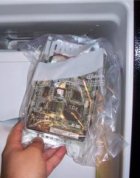
Last week, I went to pick up my son from his preschool. As soon as I walked in, the preschool Director came up to me, surprisingly calm for the news she was about to deliver. She said “My computer won’t boot ever since the power outage last week. Can you help?” She had a back-up of her work, but it was not current. (Rule number one: keep a current back-up of your PC and network.)
I told my husband, the “real techie in the family,” about the dead computer and he agreed to look at it. The prognosis was not good. The machine would not even recognize the drive, which was clicking sadly away. A senior network administrator came up with the same, bad news. Diagnostic tests would not revive the hard drive, either.
I was resigned to tell the preschool Director the sad news, when I remembered the urban legend about putting a dead drive in the freezer to revive it. I told my husband, who looked at me funny, but heck, we had nothing to lose.
We put the hard disk in the freezer. BTW, if you try this, make sure you put the hard drive in a freezer bag. The bag protects the electronics in your drive from moisture and condensation, which could cause more damage, not that it matters if the drive is truly dead. We left the drive in the freezer for over 24 hours.
On Saturday, my husband went into work. He called me and said, “you will never believe this, but I am pulling data off the drive.” No kidding. He was able to pull all the data off the drive and load it onto a new drive. Everything was restored, no data lost. CJ’s teacher was delighted, shocked and amazed.
As for the drive, once it was rebooted, it was dead again, would not boot, could not be recognized by the PC. So if you try this, be prepared to grab the data right away and do not expect the old drive to work.
It seems the urban legend is true! You can revive a hard drive long enough to retrieve your precious data. Of course, this trick will not work if the drive is damaged or burned out. I looked online and found lots of references to the urban legend. Check it out:
Amazing, but true. Let me know if you’ve tried this trick and what the result was. If you know of other techie urban legends that are actually true, I’d love to hear about them.

8 replies on “Cryogenics for the Terminally Dead Hard Drive”
This is a great one to file away, thanks!
Another weird-but-it-worked-for-me tip: if you have a movie DVD that keeps skipping in your DVD player, and you’ve cleaned it and that hasn’t worked, try dropping it in the toilet bowl and flushing, and then once it’s been flushed, pull it out, dry it, and put it back in your DVD player. I’ve done it six or eight times, and in about half the cases it cleared up the problem, and it’s certainly never made the problem worse. Worth a try!
Wow, I ***never*** would have thought to flush my DVDs down the toilet. Sounds scary, but if you say it doesn’t hurt the DVDs, then I will try it next time I have a DVD that skips. Have you tried it with Blu-Ray disks? Those are expensive and I would hate to ruin one. Thanks for the tip!
Now this I’ve got to try. Does it clean the toilet too? Now that would be worth it even if chewed my DVD!
Your blog is interesting!
Keep up the good work!
This technique will work in certain situations. I have used it several times to recover data from failed hard drives, when all other attempts proved fruitless, and usually after a ‘senior’ or ‘experienced’ technician has deemed the drive a ‘lost cause.’ However, it is never a sure thing, because as many times as it has worked for me, there are an equal number of times where it hasn’t. That is why I can’t agree with you more about how important data backups are, even for the casual user. Every person I helped with this technique I have also trained on how to back up their data so I would (hopefully) never have to try to recover data again.
I’ve done this a few times with some success, however it only works for certain hard drive problems.
I’ve used this technique since before my 15 years in the computer industry. I started placing bad drives in the freezer as young adult out of amusing physics concepts. It’s quite noticeable that HHDs that are going bad read less reliably as they become warm and assessed moving metal parts were expanding past spec.
The theory is freezing a HHD that’s out of tolerance which has track seek issues (the typical kurchunk problem) would cause metal components to contract and bring the read heads back into alignment with the platters and a readable state long enough to retrieve data. If the drive becomes too warm under use the moving components will expand and bring the drive out of spec again and needs to be refrozen. It works about 2/3 of the time if the issue is mechanical.
There are times when the drive is so far out of tolerance that freezing will not contract metal components enough to read the data. It doesn’t always work, but a good portion of the time you can retrieve some information.
I’ve never used the plastic bag. Condensation is going to form on the drive once it warms up whether you have it in a plastic bag or not. Just wipe it off with paper towel before powering it up. It shouldn’t be an issue as condensation is distilled water and it’s non-conductive.